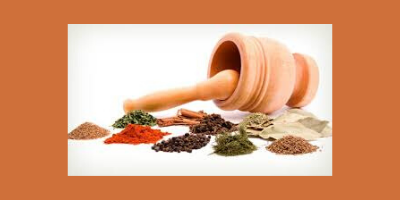Bishop’s weed, as it is called in English, belongs to the Apiaceae family along with coriander (dhania), cumin (jeera), and fennel (saunf). No wonder the amateur gets confused, since a botanical similarity exists. It is called ajwain in Hindi.
Bishop’s weed is grown in Iran, Egypt, and Afghanistan. In India it is grown in Uttar Pradesh, Bihar, Madhya Pradesh, Punjab, Rajasthan, Bengal, and Tamil Nadu.
Ajwain is a home remedy for many gastro-intestinal conditions like diarrhoea, dysentery, dyspepsia, and indigestion.
• For relieving flatulence and dyspepsia, a pinch of ajwain can be eaten with betel leaves (pan). A glass of water with a tablespoon of ajwain seeds, boiled till the water becomes half, can be drunk to relieve flatulence and colic pain.
• For acute colic pains, ajwain, dry ginger, and rock salt in the proportion of 4:2:1 should be ground together and taken in doses of 1 teaspoon with warm water.
• Equal quantities of ajwain and dry ginger soaked in two-and-a-half times limejuice dried and powdered with a little rock salt is an excellent remedy for flatulence.
• Half-a-teaspoon of the same power should be taken with a little warm water thrice a day. Chewing a pinch of ajwain and rock salt together can relieve indigestion, particularly in children.
• A mixture of ajwain seeds with buttermilk drunk twice a day relieves difficult expectoration caused by dried phlegm.
• For acute pharyngitis a pinch of ajwain can be chewed with salt and cloves.
• A hot fomentation of the seeds on the chest tied in a thin piece of cloth relieves asthmatic discomfort.
• A tablespoon of the seeds put into boiling water and steam-inhaled can cause clogged nose and bronchial passages to open. Similarly, the common cold can be relieved considerably by placing a pouch of the seeds on the pillow.
• Sore throats can be counteracted by gargling with water containing salt and a pinch of ajwain.
• Snuffing of the aromatic seeds relieves migraine.
Do keep in mind that these are household remedies that have come down the ages through the proverbial grandmothers. Efficacy may vary from person to person, time to time, and place to place. In the event of any discomfort or adverse reactions, stop taking the treatment and consult a physician immediately.
……………………………………………….
Get well remedies with Ajwains …. Bishops weed
Discovering the tang of ajwain (bishop’s weed) opens a new vista in aromatic cooking. The amateur quite often confuses ajwain with jeera (cumin), as I did in my salad days as a cook. I bought ajwain mistaking it to be an emaciated poor cousin of the jeera. On using it, I found the aromatic tang different—sharp, yet pleasing to the palate. Ajwain has never left my kitchen since then.
Bishop’s weed, as it is called in English, belongs to the Apiaceae family along with coriander (dhania), cumin (jeera), and fennel (saunf). No wonder the amateur gets confused, since a botanical similarity exists. It is called ajwain in Hindi.
Ajwain has been used as a medicinal herb from the times of ayurveda. Ancient Greek physicians used it in various carminative medicines. In the beginning of the 20th century, ajwain used to be exported from India to U.S. and Europe, since steam distillation of the seeds yielded an oil containing thymol. This was of great value in surgery as an antiseptic.
Bishop’s weed is grown in Iran, Egypt, and Afghanistan. In India it is grown in Uttar Pradesh, Bihar, Madhya Pradesh, Punjab, Rajasthan, Bengal, and Tamil Nadu.
Ajwain is a home remedy for many gastro-intestinal conditions like diarrhoea, dysentery, dyspepsia, and indigestion.
• For relieving flatulence and dyspepsia, a pinch of ajwain can be eaten with betel leaves (pan). A glass of water with a tablespoon of ajwain seeds, boiled till the water becomes half, can be drunk to relieve flatulence and colic pain.
• For acute colic pains, ajwain, dry ginger, and rock salt in the proportion of 4:2:1 should be ground together and taken in doses of 1 teaspoon with warm water.
• Equal quantities of ajwain and dry ginger soaked in two-and-a-half times limejuice dried and powdered with a little rock salt is an excellent remedy for flatulence.
• Half-a-teaspoon of the same power should be taken with a little warm water thrice a day. Chewing a pinch of ajwain and rock salt together can relieve indigestion, particularly in children.
• A mixture of ajwain seeds with buttermilk drunk twice a day relieves difficult expectoration caused by dried phlegm.
• For acute pharyngitis a pinch of ajwain can be chewed with salt and cloves.
• A hot fomentation of the seeds on the chest tied in a thin piece of cloth relieves asthmatic discomfort.
• A tablespoon of the seeds put into boiling water and steam-inhaled can cause clogged nose and bronchial passages to open. Similarly, the common cold can be relieved considerably by placing a pouch of the seeds on the pillow.
• Sore throats can be counteracted by gargling with water containing salt and a pinch of ajwain.
• Snuffing of the aromatic seeds relieves migraine.
Do keep in mind that these are household remedies that have come down the ages through the proverbial grandmothers. Efficacy may vary from person to person, time to time, and place to place. In the event of any discomfort or adverse reactions, stop taking the treatment and consult a physician immediately.
………………………………………………





0 Comments